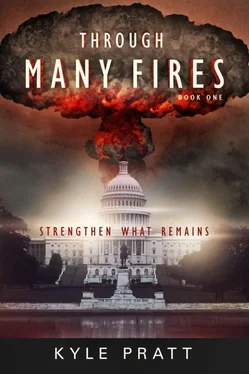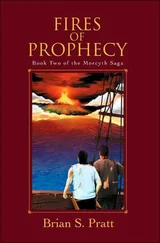She shook her head. “They’ll take away my kid.”
Exhaustion swept over him like a wave. Caden shook his head slowly then turned to his men. “Move out ASAP.” Turning to his father and Sue, he said in a softer tone, “Let’s go home.” He marched from the church. Death has become common, too common. Clear of the carnage he paused, looked back and then turned to his men. “Move the bodies outside, and cover them with something.” It wasn’t enough, but it was all he could do. “Get their weapons and put them in the back of the SUV.”
Minutes later, Caden walked past a young soldier washing his bloody hands with a bottle of water. “You drive,” Caden ordered and sat in the passenger seat. His father and Sue climbed in behind him. As the convoy pulled away from the church, thoughts of the firefight mixed with joy at finding his father and Susan. All of this was tempered by the uncertainty about Peter. Caden felt drained and knew that he was coming down from a combat-induced adrenaline high.
As a teen, he had wanted nothing more than to get away from the small town of his birth. College, ROTC, the army, and a job in D.C. all seemed to set up the small town boy for a career in the big league of Washington politics. Now he could think of nothing better than all of his family being reunited in Hansen.
Turning to his father he asked, “Why didn’t you travel back the way you went, along the North Road?”
“At first I did, but after the blast it became a big parking lot. Nobody was moving except for some guys on motor cycles. Someone tried to steal a bike and got shot and that led to more fighting and shooting. I got off that road when I could and headed toward the freeway, but even on the back roads the going was slow. It took us the rest of the day and most of the night to get to the outskirts of Olympia.
“It was late at night…early in the morning really, when we reached the Nisqually River outside of Yelm. Troops had set up a check point at the bridge to keep people from going north toward the red zone….”
“People were trying to get in?” Then Caden recalled the night of the Washington D.C. blast and how some people headed into the city.
His father nodded. “I had set out for Tacoma earlier that day and would have gone even after the blast. Anyway, at the check point, troops had set up a field hospital. Sue was feeling nauseous and I was concerned because we had been close to the blast.”
“Were you exposed? Are you sick?” Caden asked.
“No I’m fine, not ill.”
Satisfied that there was no immediate problem, Caden said to his father, “What happened? Why did it take so long to get this far?”
“When we stopped at the med station, I got out a gas can and filled the tank. Later, when we came out, the truck started and then died. Someone had punctured the gas tank and drained it.”
“I’m surprised you couldn’t fix a puncture hole.”
“I could patch it, but where would I get more gas? By that time you couldn’t buy any, so we walked.”
They continued talking until they reached the Hansen blockade. Caden and his driver got out of the car and walked up to the guards. “We have three trucks of supplies and a fueler,” Caden said.
“You got food in those trucks?” one of the men on the barricade asked.
“We sure do,” the driver replied.
Caden had his men pass out one MRE for each guard on duty. Everyone seemed happy.
When the last truck was safe behind the barricade Caden told the senior man, “I’m going to take my family home. Go to the armory and unload the Ammo, communications gear and the first truck of MREs. We’ll distribute the remainder to the town and refugee camp in the morning after I arrive.”
“Yes sir,” the soldier replied and soon the convoy was moving along the road.
Ten minutes later Caden’s SUV rumbled up the long dirt driveway to the farmhouse. Maria and Lisa stepped out on the porch as he slowed to a stop. Trevor stepped from the car first.
“Mom,” Lisa yelled, “come here you’ve got to see this.” Then she leapt from the porch into her father’s arms.
Walking out the front door his mother stifled a scream and nearly fell down the steps as she joined Lisa in hugging Trevor. Then Sue emerged from the car and the excitement spread.
Caden walked over to Maria and hugged her then stood with his arm resting on her shoulder while the three others got reacquainted and came to terms with the fact that Peter was not with them.
After several minutes of hugs and tears, Trevor explained to his wife and daughter how he had no chance to find Peter before the nuclear bomb went off.
His mother comforted Sue and the two consoled one another about Peter. Finally his mother looked down and gently touched Sue’s belly. “Is the baby all right?”
“The baby is fine, but I’m exhausted.”
“Baby?” Caden asked.
“I’m pregnant,” Sue replied.
They talked long into the night, swapping stories of their journeys and of Peter. Caden again told how he found Adam at the wreck along the highway where his mother died, that thieves later threatened them and Maria came to their rescue. His father told of driving up North Road and arriving at Peter and Sue’s home.
“He found me in the corner of the bedroom with a pistol,” Sue said. “Peter told me Trevor was coming, but it was a good thing he called out to me. I was really scared because everyone was leaving, and there were sirens, reports of looting and the sound of gunshots.”
“We were barely out of the house when we saw the mushroom cloud,” his dad added.
“My head was bouncing off an airplane fuselage at that moment,” Caden said.
“Did you leave a dent in it,” Lisa asked.
With a smile he replied, “Should I tell Dad how you shot me?”
Lisa threw a cushion at him.
“You shot him?” his dad asked Lisa.
His mother and Maria laughed as Trevor looked from face to face for an answer.
Caden couldn’t recall what time he went to bed, but when the old wind-up alarm clock rang to life he moaned and slapped at it. Sitting up he hoped for an easy day.
He followed the smell of coffee to the kitchen, and found Maria warming a baby bottle on one side of a camp stove.
“You want breakfast? I think I can do eggs and pancakes on this thing.”
“Black coffee would be great.”
After two cups he felt alive enough to eat. “Eggs might be good.”
“Coming up.” She cracked an egg on the edge of the green camp stove. “You look awful,”
“Thanks. I’m just tired,” he said with a yawn. Hopefully today will go smoothly.” After eating he stood, stretched and headed back to the bedroom to put on his uniform.
Maria was waiting at the foot of the stairs with a bag as he came down. “I made you lunch.”
He smiled. They kissed and he headed off to the armory wondering how he could feel so married, but not be. He was still smiling as he reached the main road. He expected that there would be no other cars during his short commute however, he gradually became aware of an unusual number of people. Some were talking, others walking, but all of them seemed to point or stare at him. Don’t get paranoid. They’re curious because you’re driving a car and in uniform.
Nearing the city limits he passed clusters of people going in his direction. Where are they were all headed so early in the morning? A police car sped by with sirens blazing and turned up the hill toward the armory. Ahead another crowd walked briskly up the same road. He pressed down on the accelerator.
What’s going on? He glanced at thirty to forty people on both sides of the road. Some ran up the hill. Why are they all headed toward the armory? He was tempted to stop and ask, but their faces were gaunt, desperate and fearful. Get there and then assess the situation. As the chain link fence came into view, so did fifty or sixty people clustered around the gate.
Читать дальше












